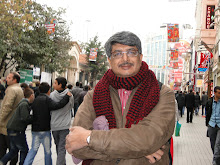We started out with one all-India party and that was the Indian National Congress. The Communist Party of India was probably the next in terms of coverage, prominence and a fair bit of sympathy but no political power so to say.
In the first five Lok Sabhas, Congress was the single dominant party and the others were in low double digits. All other parties were below double figures. Similar pattern follows for the second, thru eighth Lok Sabha except for the sixth Lok Sabha which saw a Janata Party government. This position changed rapidly from 1989 onwards.
This indicated an all round preference for a national party.
This period also saw major reorganization of states on linguistic basis. As mentioned in my earlier post, this created space for large linguistic and culturally homogenous groups to be together. Though done with much reluctance, this eliminated all chances of culture, language and other similar emotive reasons from the political platform. This did not create any drift towards regional political parties.
What then contributed to the rise of regional political outfits and why did they get political legitimacy through the electoral process??
One of the first states to move away from national party system to state level entities was Tamil Nadu and the trigger was “imposition of Hindi”. There were widespread riots against the declaration of Hindi as a sole link language and emotions ran high. There was a speech made in Indian Parliament by C N Annadurai advocating the secession of the four southern states into a separate
Shiv Sena, in Maharashtra, was one of the earliest regional political outfits. They gained tremendous support and prominence fighting for Mumbai to be part of Maharashtra and not
Andhra Pradesh – NTR with his Telgu Desam was essentially born to save the “Telgu pride”. This was the perceived humiliation of Telgu leaders in Congress and discrimination against the state. The result is TDP a powerful regional party where a national party reigned supreme. It now has to share this space with two regional parties in the state. The scales have tilted back in favour of Congress since 2004.
One cannot forget large scale insurgency in Nagaland and Mizoram, essentially Christian majority states whose emotional, cultural and social integration in the Indian main stream has never happened. Whilst these two states live an uneasy peace, Manipur is on the boil now.
The latest headache now confronting many state governments is the armed rebellion by Naxalites.
What we have is a multi-linguistic, multi-cultural, multi-religious social structure coming together for the first time in a political union. This diverse structure is made more complex by a rigid caste system, deep prejudices, wide spread backwardness, lack of healthcare, education, opportunity and so on.
In such a milieu, what was needed was a fair and inclusive governance and emphasis on rapid development.
When one analyses each of these state crises, it is easy to discern
- a sense of callousness and high handedness,
- inability to empathise with local needs and sentiments,
- a political process that is arbitrary, favouring certain groups to the exclusion of all others,
- perpetuating deep rooted economic and social inequalities,
- perception of favaouritism / appeasement towards certain groups (favourite whipping boy of regional parties)
- attempts to initiate hegemony of thoughts, culture and language,
- government machinery perceived as brutal, biased and openly unfair,
- Existence of corruption at every level in society and the administrative set-up.
Against, this backdrop when you have a powerful voice addressing a limited regional group and promising fairness, equality of opportunity or opportunity for locals, resources for development, access to basics of life, value for minerals / raw materials, becomes an instant hero. These regional outfits gain prominence and legitimacy in eventual course. Over a period of time, these groups become political powerhouses.
What we see today is a very fragmented social structure and a fractured political class is only a reflection of the society it seeks to represent.
Post elections scenario
This post was written before the elections and the current wisdom might make this problem small. I earnestly hope this is so but the problems shall not disappear unless the root causes are attacked.
The open unashamed wrangling for seats should have given rise to immense revulsion but I see the gigantic state machinery involved in making the problem less severe than it really is.
There are many serious gaps in Centre – State relations and at the state level the problems are more severe. It will not be wise to say that regional parties have been shown their place. Infact, Elections – 2009 has shown many of them increase their vote share. The quirky nature of electoral arithmetic however, has ensured that they have lost seats.
Far-sighted thinkers and seasoned political figures from both major political groupings should seize this opportunity and, work towards expansion and consolidation of national political parties.





16 comments:
Mavin,Congress in all their ruling years never bothered about the regional aspirations.Take an example of the NE states.Just because these seven states put together do not give the number of Lok Sabha seats as much as may a state in North.It seems,attention to regional aspirations are in direct proportion to the number of seats in the states.Congress had,it seems,had out-sourced its responsiblities,which has resulted in the present of affairs.You have the latest example...with 200+ seats congress is beating drums.
Mr. Chowla,
It's not just the Congress (although they have been in power the longest)but also the BJP and other 'mainland' parties who don't much care for the Northeastern states...It's sad but that's how it is...
Mavin, you have analysed the rise in importance of regional parties very lucidly. It is no wonder, because of the neglect by national parties and the Central Government, that regional parties should get local support.
How local leaders trick the people and use them to score political points was seen in the Singur- Tata- Mamata drama.
I agree expansion and consolidation of National parties is needed.
BKC and Sraboney
It is not just North East India. I have been to some villages in western Maharashtra (supposedly a prosperous region) and the extent of degradation and backwardness has to be seen to be believed.
Sixty two years on we have not done mch with a purpose. Things have happened more by accident.
Konkan Railway happened only when George Fernandes and Madhu Dandavate were in power and it was kept outside the purview of the Railways. The need was first felt in the early 1950s but could see the light of the day in late 1990s.
Manju,
You will observe in our state Maharashtra itself, Congress (a national party) has only occupied power. Aren't large parts of the state without water, electricity, roads, primary health care - leave alone industrial development or availability of jobs / opportunities.
A very analytical and interesting post. Agree with you on the reasons for the rise in regional outfits. Yes, the regional outfits have not been decimated yet and there is a need for, like you say, "Far-sighted thinkers and seasoned political figures from both major political groupings should seize this opportunity and, work towards expansion and consolidation of national political parties". The national parties need to re-start their work at the grass root level, and that work has to be 'people issues focussed'.
My take on the national parties priorities has been adapted from the business world and I believe it has to be, "Act regionally and think nationallly". In this election all parties that did not follow this dictum have suffered losses.
Mavin, Another well thought post.
For long no party actually cared of other states..not even the representatives from that states that small parties had to emerge.
Another thing is Cabinet Ministers only concentrating on upliftment of their own states. I remember when Jaffer Sharif was incharge of Railways, Karnataka benefited max. Same is the case with other leaders.
Good analysis. In a country as large and diverse as ours, it is impossible to have a credible national party. Regional parties on the other hand should not have a mandate in the center because they are just that- regional. What I always suggest is to have a Federal system in India rather than the Republic one. Frankly, 60 years of republic has not addressed the issues and never will since a guy in state A is not concerned about the progress of state B. A Federal system would address both - a national representative party and a party catering to local needs.
JPJ,
Ours is a curious mix. What works in Orissa does not in neighbouring Andhra. TN has been the bastion of regional parties and is well administered unlike UP.
The point to be noted is in a national party, if any group gains dominance then fair and inclusive national governance suffers...
This will eventually evolve to a more mature system in the coming years. Hopefully, this process will be accelerated by a few electoral defeats.
Hi Solilo,
That is right. Railways seems to be the plum portfolio that everyone wants.
I wonder why? Maybe the maximum misuse and money siphoning is possible from here.
People have lost patience and they need to see results fast. They do not understand the term "lack of resources" any more. It will be a scramble for resources and distribute them amongst your followers / village, taluk, district, state or community.
Hello Priyank,
Long time...hope everything is well.
But, India is indeed a federal structure. Our constitution says so and has a clear demarcation across the duties / obligations of the Centre and States.
These are called the Centre list, State list and Concurrent list.
The real problem has been ;ack of political will and purpose.
read it very late .. but fine analysis .. to me there is one more reason behind the rise of regional parties . presence of 'sub-nationalism' in most of these states .. although we have regional parties even in UP or they are not in Gujarat but i think they are exceptions rathar than the rule .. a sub-nationalism and our founding fathers initial decision to create states along the lines of language has added to it.
wish we could still move to smaller states which will distory this very strong regional identities .. May be idea of India as a one country with its own unique identity would be complete then ..
Hi Anil! You have been awarded! Please come over and pick up your award at my blog!
SP,
Regionalism expressed through politics is not entirely a bad idea. We seem to generalise the experience of UP.
TN has been ruled by regional parties for forty years and the state is well administered and has seen significant development.
Sub-nationalism again is not a bad idea. It is our rooting and without a regional identity we become a sanitised uniform India. The idea of India is too big, diverse and colourful to be slotted in a single mould.
Thanks Gopi
You are right this problem may seem smaller now after the recent elections. But I think unless these problems are addressed we will again see the rise of regional parties that are not necessarily good for the country. Also the problems in Kashmir, NE etc. will fester until the fragmentation is addressed.
Regional parties thrive on the principle of divide and rule which is very harmful for the nation.
Post a Comment